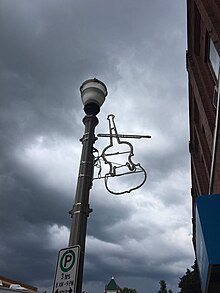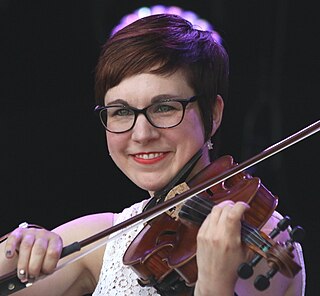History
Origins
The Canadian Open Old-Time Fiddling Championship began as a fundraiser for the Rotary Club, with sponsorship from the club and the CBC. [2] It came at a time when fiddle music was popular on the radio and the number of fiddlers in Ontario began to increase.
The idea for the contest came from Shelburne Royal Bank manager Cliff McIntosh, after he saw a fiddle contest in another province. [3] It was proposed as a fundraiser for the Rotary Club to help fund their charity donations, with the club set to organize the event. There were doubts from Rotary members that a contest would work, considering the Rotary Club hoped that people would pay to hear fiddlers play and compete despite the music being free on the radio. [3] There was also concern about finding enough fiddlers to compete, which led to volunteers driving around the region to promote the event and find fiddlers. [4] As there were few contests of its kind before the 1950s, it was somewhat of a new idea for locals to consider fiddling as a competition. The committee also advertised through various newspapers and radio stations across the region, and had fiddlers spread the word of the contest. [4]
Don Fairbairn, who hosted "Neighbourly News" on CBC, also got involved in the event, and was able to get the CBC to broadcast the contest. The involvement of the CBC helped grow the audience of the contest and its popularity. [3] In 1973, the CBC also produced a documentary called "The Fiddles of Shelburne" about the event and its origins. [5]
The first contest happened on August 11, 1951, aligning with an open slot in the CBC's broadcasting schedule. [3] Held in the Shelbourne Arena, it had the initial competition round on Friday, with the finals on Saturday. Admission costs ranged from 35 cents to 1 dollar, depending on age and event. Contestants paid $2 to enter with proceeds going to charity. The fee that was discontinued in 1983. Organizers made about $1000 from the event (which is nearly $12,000 in 2024). [4] They had 44 contestants in total, including local fiddlers Lome Donaldson, Charlie Dyer, Annie Webster, and Albert Mews. The first winner was Mel Lavigne, with the first song played "The Victory Breakdown." [6] [3]

The event became a massive success and brought thousands of visitors to the small town, with roughly 10,000 people in attendance between the players, organizers, volunteers, and audience. [3] [4] Discussing its impact, the Shelburne Free Press wrote "in a small community like Shelburne, everyone is affected to some degree by the Fiddle Contest, because so many of the town’s residents dedicate their time and efforts towards the event’s success...by 1951, the fiddle and fiddle music were traditions of Dufferin community life." [3]
Growth
Following its success in the early years, the event grew past just the two-days of the contest. Over the years, the festival added a country jamboree, jam sessions, square dancing, concerts, step dancing, a parade, a Fiddle Queen pageant, street fairs, dinners, a BBQ and market, and a church service. [7] [8] The events span over a week, expanding the tourist traffic to the town. The popularity of the event also led to Shelburne being dubbed "Fiddleville." [7] It also proved to be a major fundraiser for the Rotary Club. While it grossed about $1000 in 1951, the amount grew by 1972 to $20,000 (roughly $148,000 in 2024), with about three-times that amount being put into the community through accommodations, shopping, and food spending by visitors. [8]

The earlier competitions held a jamboree while the judges decided on the winners. [9] The contestants were recorded as they played, allowing the judges to listen again to their performances and decided together the top players. The judges now use headphones to listen to fiddlers, while remaining in an ‘open judging’ situation where they can watch the players on stage while listening through the audio equipment. [10] Their "audience-attraction" played a part in their scores, acting as a performance/presentation criteria. [11]
By the 1980s, the contest grew to hosting over 150 fiddlers and eight separate classes. [2] The name of the event changed over the years, from the "Canadian Open Championship Old Time Fiddlers’ Contest," to "The National Fiddle Contest," and more recent returning to a version of the original as the "Canadian Open Old Time Fiddle Championship." [4]
By 2004, the Canadian Open Old Time Fiddle Championship saw contestants from across Canada and the United States compete, becoming known as "the contest to enter." [12] However, the Pembroke Fiddle & Step Dancing contest, along with the Canadian Grand Masters, have eclipsed the contest in terms of attracting a wider range of fiddlers across the country, especially due to their closeness in dates and being near Labour Day weekend. Yet, as argued by Sherry Johnson, the Canadian Open Old Time Fiddle Championship helped shaped these contests and their formats and became a vessel for "national exposure" for the contestants. [13]
Decline of Old-Time Fiddlers and Reinvention
By the 2010s, the contest was primarily organized by the Rotary Club of Shelburne, with various local sponsors. [14] In 2018, they merged with the Heritage Music Festival in a move to rejuvenate the festival. [1] This came as growing concern over the perceived dwindling number of fiddlers in the region, despite a growth of young fiddlers in Toronto. At the same time, the championship saw fewer contestants than previous years. With the help of siblings Linsey and Tyler Beckett, and former champions Scott Woods and Louis Schryer, they helped to promote the contest and entice new fiddlers to sign up for the event. [1] Another major issue impacting the survival of the festival came in 2020, with the cancellation of the contest due to the pandemic. [15] Despite plans to reschedule for the next year, it was cancelled again. As of 2024, the contest has not been held since 2019.




